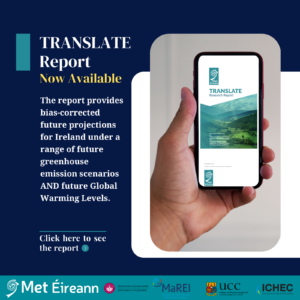Release of the TRANSLATE research report: A ‘step-change’ in future climate information for Ireland.
Today, the final report from the TRANSLATE initiative has been launched. This report is the result of a collaborative effort between University of Galway – Irish Centre for High-End Computing (ICHEC), University College Cork – SFI Research Centre for Energy, Climate and Marine (MaREI) and Met Éireann to provide the first ever standardised, bias-corrected climate projections for Ireland.
TRANSLATE brings together all previous climate projections of relevance for Ireland, enhancing and improving their confidence and robustness and tailors them to the Irish context. The new report provides an in-depth overview of Ireland’s future projections across a range of potential future green-house emission scenarios along with descriptions of the application of the data to produce risk frameworks to benefit Irish society. In addition, the report outlines projections based around future levels of global warming, allowing decision-makers to explore what Ireland would look like in different ‘warmer-world’ scenarios. The outputs from the TRANSLATE project play a key role in the production of climate services for decision-makers in Ireland and the development of these services is being coordinated by the NFCS (National Framework for Climate Services).The NFCS serves to support adaptation to climate change in Ireland by providing tailored information and services to the public and key stakeholders in Irish society. More information about the NFCS can be found here.
The TRANSLATE project moves beyond the generic average future temperature and precipitation information often associated with regional climate projections. It uses this information to create user and sector relevant climate indices that can be effectively and directly integrated into adaptation planning such as sectoral adaptation plans, as well as risk frameworks.
TRANSLATE climate projections display a warming climate signal for Ireland, with temperatures projected to increase across all greenhouse gas emission scenarios. The TRANSLATE dataset confirms that Ireland is likely to experience a decrease in the frequency of cold winter nights and up to a 10-fold increase in the frequency of warm (> 15°C) summer nights, alongside an increasing number of heatwaves by the end of the century. In terms of precipitation, summers are projected to be drier and winters to be wetter, with precipitation increasing annually overall.
The report also outlines how the TRANSLATE project has produced an accessible risk framework which gives decision makers insight into changing future risk. It is envisaged that the results from the TRANSLATE initiative will help to inform national policy, further our understanding of the impacts of climate change at a local scale in Ireland and as a result, help inform effective adaptation pathways.
The report and more information about the TRANSLATE project can be found on the TRANSLATE webpage.
